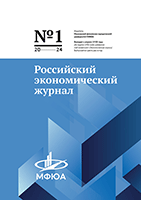Архив
Российский экономический журнал 2 / 2022
Перспективные направления развития экономики совместного использования
Зверева Т.В.
МЕТОДОЛОГИЯ, ТЕОРИЯ, ПРАКТИКА
Научная статья
УДК 330.341.2
https://doi.org/10.33983/0130-9757-2022-2-86-99
Перспективные направления развития экономики совместного использования
Татьяна Владимировна Зверева — доктор социологических наук, доцент, профессор Департамента налогов и налогового администрирования, Финансовый университет при Правительстве Российской Федерации, Москва, Россия, tatzvevlad@mail.ru, https://orcid.org/0000-0002-0269-067X
Аннотация. С развитием цифровых технологий появляются новые формы совместного потребления, получившее название «экономика совместного использования». Цифровизация позволила охватить широкий спектр общественных ресурсов и выйти за рамки небольших групп и личных отношений, таким образом мы наблюдаем технический и социальный аспект экономики совместного использования. Этот двойной цифровой переход к совместному использованию позволил добиться широкого доступа к ресурсам, что создало новые модели и практики совместного использования, что привело к созданию нового класса систем распределения ресурсов, которые получили название «цифровой экономики совместного использования». В данной статье проведен анализ экономики совместного использования как социально-экономического явления на основе цифровой платформы.
Практическая значимость полученных автором результатов состоит в возможности использования предложенной теоретической платформы для дальнейшего изучения возможностей экономики совместного использования для различных участников взаимодействия: граждан, бизнеса, организаций государственного сектора.
Ключевые слова: государственный сектор, муниципалитет, недоиспользуемые активы, потребление, социальный обмен, социальные блага, цифровая экономика, экономика совместного использования, электронная коммерция
Для цитирования: Зверева Т.В. Перспективные направления развития экономики совместного использования // Российский экономический журнал. 2022. № 2. С. 86–99. https://doi.org/10.33983/0130-9757-2022-2-86-99.
METHODOLOGY, THEORY, PRACTICE
Original article
Perspective areas of development of the sharing economy
Tatiana V. Zvereva — Doctor of Science (Sociology), Docent, Professor at the Department of Taxes and Tax Administration, Financial University under the Government of the Russian Federation, Moscow, Russia, tatzvevlad@mail.ru, https://orcid.org/0000-0002-0269-067X
Abstract. With the development of digital technologies, new forms of joint consumption have received the name "Share Economics". Digitalization made it possible to cover a wide range of public resources and go beyond small groups and personal relationships, so we see the technical and social aspect of the sharing economy. This double digital transition to joint use allowed us to achieve broad access to resources, which created new models and practices of sharing, which led to the creation of a new class of resource allocation systems that were called the "digital sharing economy". This article analyzes the economy of sharing as a socio-economic phenomenon of a bi-based digital platform.
The practical significance of the results obtained by the author consists in the possibility of using the proposed theoretical platform to further explore the opportunities of the sharing economy for various participants in the interaction: citizens, business, public sector organizations.
Keywords: public sector, municipality, underutilized assets, consumption, social exchange, social benefits, digital economy, sharing economy, e-commerce
For citation: Zvereva T.V. Perspective areas of development of the sharing economy. Russian Economic Journal. 2022;(2):86–99. (In Russ.). https://doi.org/10.33983/0130-9757-2022-2-86-99.
Список источников
- Гудкова Т.В., Каспарян А.С. Факторы, влияющие на успешность внедрения цифровых технологий в деятельность предприятий России // Российский экономический журнал. 2021. № 5. С. 93–110. https://doi.org/10.33983/0130-9757-2021-5-93-110.
- Matzler K., Veider V., Kathan W. Adapting to the sharing economy. MIT Sloan Management Review. 2015;56(2):71–79.
- John N.A. Sharing and Web 2.0: the emergence of a keyword. New Media & Society. 2012;15(2):55–64.
- Böcker L., Meelen T. Sharing for people, planet or profit? Analysing motivations for intended sharing economy participation. Environmental Innovation and Societal Transitions. 2017;(23):28–39.
- Lessig L. Remix: Making Art and Commerce Thrive in the Hybrid Economy Penguin. New York, 2008. 327 р.
- Шваб К. Четвертая промышленная революция. М.: ЭКСМО, 2017. 208 с.
- Ревенко Н.С. Новые контуры цифровизации за рубежом и в России: экономика совместного потребления // Экономика. Налоги. Право. 2018. № 2. С. 103–110.
- Botsman R., Rogers R. What`s Mine is Yours. The Rise of Collaborative Consumption. Harper Business, New York. 2010. 274 р.
- Gruszka K. Framing the collaborative economy — Voices of contestation. Environmental Innovation and Societal Transitions. 2017;(2):92–104.
- Frenken K., Meelen T., Arets M., Van de Glind P. Smarter regulation for the sharing economy. The Guardian. 2015;(20):175–189.
References
- Gudkova T.V., Gasparyan A.S. Factors influencing the success of the introduction of digital technologies in the activities of Russian enterprises. Russian Economic Journal. 2021;(5):93–110. (In Russ.). https://doi.org/10.33983/0130-9757-2021-5-93-110. (In Russ.).
- Matzler K., Veider V., Kathan W. Adapting to the sharing economy. MIT Sloan Management Review. 2015;56(2):71–79.
- John N.A. Sharing and Web 2.0: the emergence of a keyword. New Media & Society. 2012;15(2):55–64.
- Böcker L., Meelen T. Sharing for people, planet or profit? Analysing motivations for intended sharing economy participation. Environmental Innovation and Societal Transitions. 2017;(23):28–39.
- Lessig L. Remix: Making Art and Commerce Thrive in the Hybrid Economy Penguin. New York, 2008. 327 р.
- Schwab K. The Fourth Industrial Revolution. Moscow: EKSMO, 2017. 208 р. (In Russ.)
- Revenko N.S. New contours of digitalization abroad and in Russia: The economy of joint consumption. Economy. Taxes. Right. 2018;(2):103–110. (In Russ.).
- Botsman R., Rogers R. What`s Mine is Yours. The Rise of Collaborative Consumption. Harper Business, New York. 2010. 274 р.
- Gruszka K. Framing the collaborative economy — Voices of contestation. Environmental Innovation and Societal Transitions. 2017;(2):92–104.
- Frenken K., Meelen T., Arets M., Van de Glind P. Smarter regulation for the sharing economy. The Guardian. 2015;(20):175–189.
Статья поступила в редакцию 10.02.2022; одобрена после рецензирования 14.02.2022; принята к публикации 25.02.2022.
The article was submitted 10.02.2022; approved after reviewing 14.02.2022; accepted for publication 25.02.2022.

